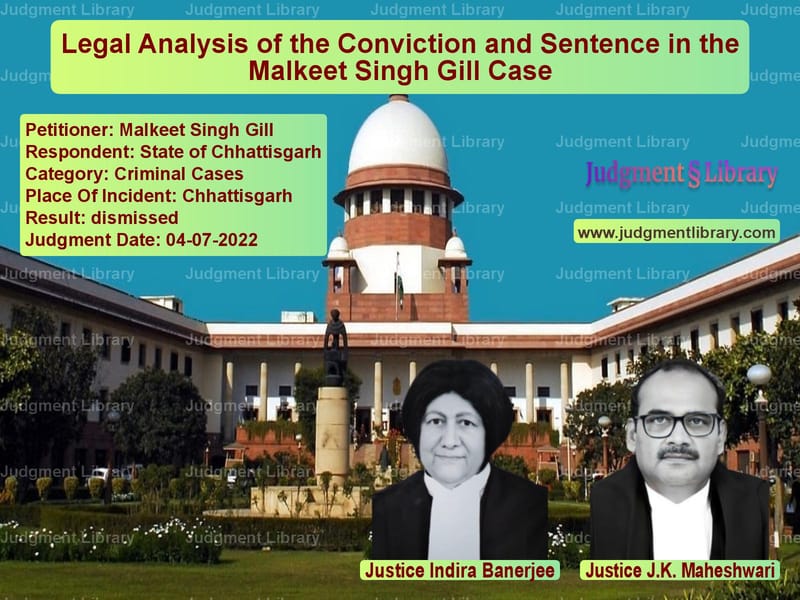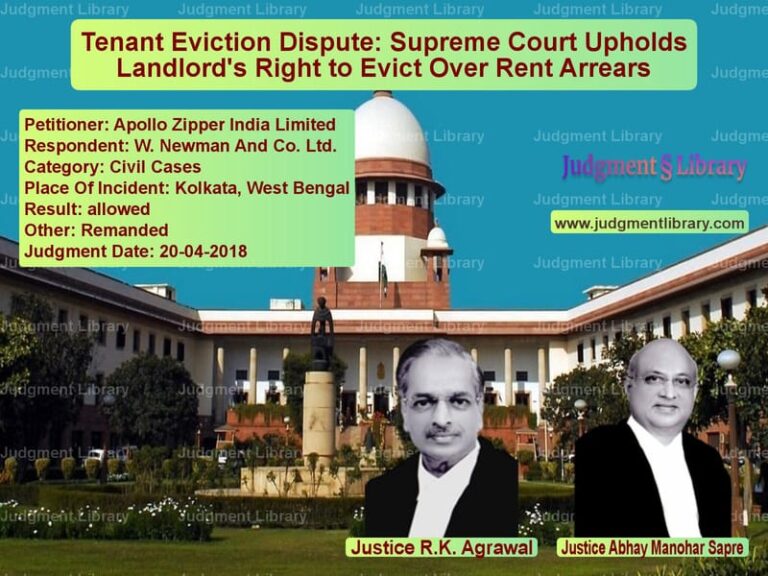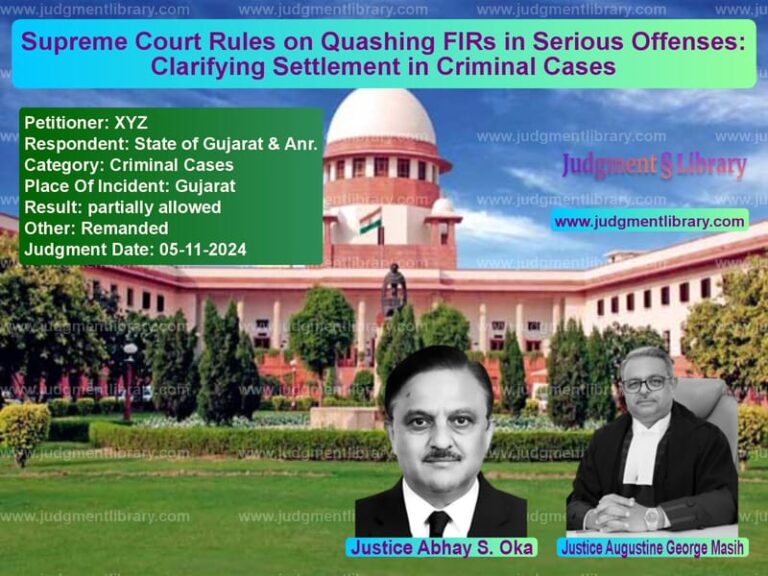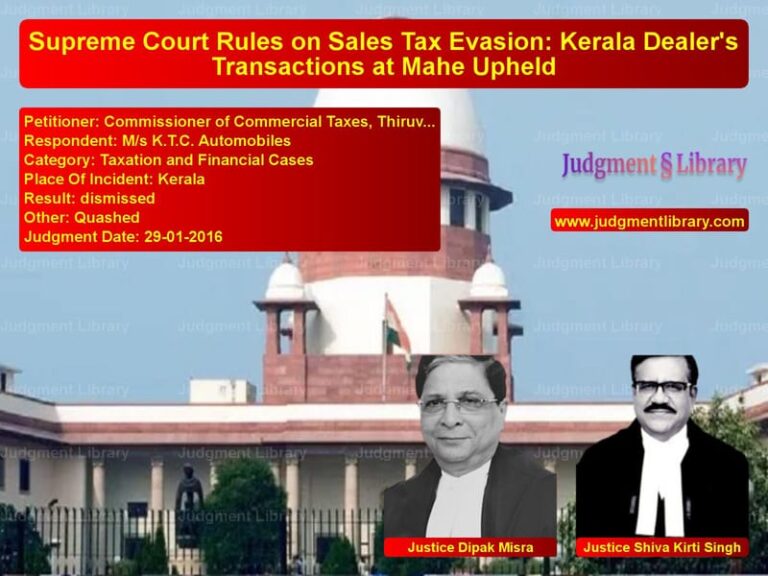Legal Analysis of the Conviction and Sentence in the Malkeet Singh Gill Case
The case of Malkeet Singh Gill vs. The State of Chhattisgarh involves a significant legal challenge concerning the conviction of the appellant under sections of the Indian Penal Code (IPC) related to fraudulent financial transactions and breach of trust. The case highlights issues of criminal conspiracy, fraud, and breach of fiduciary responsibility. The judgment delivered by the Supreme Court of India deals with the appeal against the conviction, upholding the lower courts’ findings but offering important insights into how sentences should be managed in cases of concurrent offenses.
Background of the Case
The appellant, Malkeet Singh Gill, was convicted along with several others for crimes involving misappropriation of funds, fraudulent activities related to financial dealings, and violations of trust under sections 409, 420, 120-B, 467, 468, and 471 of the IPC. The case arose from actions taken by the accused while working for a financial firm, where it was alleged that they had misappropriated large sums of money from investors under the guise of lucrative deposit schemes. These deposits were purported to offer high returns but ultimately were not repaid when due, leading to financial losses for several individuals.
The appellant and his associates were accused of misleading investors with promises of returns while operating outside the legal boundaries set by financial regulatory authorities. The trial court convicted the appellant, sentencing him to serve multiple years of imprisonment along with fines. The appeal was filed by the appellant challenging both the conviction and the severity of the sentence.
Legal Issues in the Case
- Was the appellant rightly convicted under sections 409 and 420 of the IPC for breach of trust and fraudulent misrepresentation?
- Should the concurrent sentences imposed on the appellant be modified, considering the nature of the offenses?
- Did the lower courts correctly assess the appellant’s role in the criminal conspiracy and misappropriation of funds?
- What legal principles should guide the setting of sentences for crimes involving financial fraud and breach of fiduciary duties?
Arguments by the Appellant (Malkeet Singh Gill)
- The appellant argued that he had not engaged in any fraudulent activity or conspiracy, and that he was merely following the instructions of his superiors in the firm.
- The appellant contended that the charges under section 420 (cheating) and section 409 (criminal breach of trust) could not be substantiated as there was insufficient evidence to show that there was a deliberate attempt to defraud the investors.
- The appellant emphasized that the punishment was overly harsh, and that his role in the offense did not merit such severe penalties, particularly because he was not the principal architect of the fraudulent schemes.
- He also argued that the sentences for various offenses should not run consecutively but should be considered to run concurrently, considering the nature of the offenses and the circumstances of the case.
Arguments by the Respondent (State of Chhattisgarh)
- The respondent, represented by the prosecution, argued that the appellant’s actions were part of a larger conspiracy to defraud investors, and that his role was critical in the operation of the fraudulent financial schemes.
- The prosecution contended that the appellant had acted with full knowledge of the fraudulent nature of the financial dealings and had misrepresented the returns promised to the investors.
- The prosecution also supported the sentence imposed, asserting that the appellant’s involvement in large-scale financial fraud warranted a stringent penalty, including imprisonment and fines.
- The respondent further argued that the concurrent running of sentences was justified given the gravity of the offenses and the appellant’s role in the conspiracy.
Supreme Court’s Observations
- The Court noted that the appellant’s involvement in fraudulent financial activities was clearly established by the evidence presented in the case, including witness testimonies and financial records.
- The Court observed that financial frauds involving breach of trust and misappropriation of funds have severe implications for society, and that such offenses should be dealt with strictly under the law to maintain public confidence in financial institutions.
- The Court also acknowledged that the appellant’s actions were part of a larger scheme orchestrated by senior officials in the firm, but emphasized that the appellant, as a participant in the scheme, still bore significant responsibility.
- The Court found that the sentences imposed by the lower courts were in line with the legal provisions and the seriousness of the offense, but it considered whether the sentences should run concurrently or consecutively.
The Court ruled:
“Given the nature of the offenses, the Court upholds the conviction of the appellant under Sections 409, 420, 120-B, 467, 468, and 471 IPC. However, the Court directs that the sentences awarded to the appellant for each offense shall run concurrently, in light of the mitigating circumstances presented by the appellant’s counsel.”
Final Judgment
The Supreme Court issued the following directives:
- The appellant’s conviction under Sections 409, 420, 120-B, 467, 468, and 471 IPC is upheld.
- The sentences for each offense are directed to run concurrently, with no further increase in the total term of imprisonment.
- The appellant is also required to pay fines as originally imposed by the trial court, which will be collected by the authorities for the benefit of the victims.
- The appellant’s appeal for a reduction in sentence is denied, and the conviction remains as determined by the trial and appellate courts.
Implications of the Judgment
- The ruling reinforces the legal principle that those involved in financial fraud, even at lower levels, must be held accountable for their actions, as they contribute to the overall damage caused by such schemes.
- The decision underscores the importance of maintaining public trust in financial systems and ensuring that individuals involved in fraudulent activities are properly penalized.
- The judgment also highlights the discretion available to courts in determining whether sentences should run concurrently or consecutively, with a focus on the nature of the offenses and the principles of justice and fairness.
- The case will likely serve as a precedent for future cases involving financial fraud and breach of trust, particularly in terms of sentencing and the application of concurrent sentences for multiple offenses.
This judgment serves as an important reminder of the strict penalties for financial frauds and the need for financial institutions and individuals to operate within the law. The Court’s balanced approach to sentencing in this case reflects a commitment to justice while considering the unique facts of each case.
Petitioner Name: Malkeet Singh Gill.Respondent Name: State of Chhattisgarh.Judgment By: Justice Indira Banerjee, Justice J.K. Maheshwari.Place Of Incident: Chhattisgarh.Judgment Date: 04-07-2022.
Don’t miss out on the full details! Download the complete judgment in PDF format below and gain valuable insights instantly!
Download Judgment: malkeet-singh-gill-vs-state-of-chhattisgar-supreme-court-of-india-judgment-dated-04-07-2022.pdf
Directly Download Judgment: Directly download this Judgment
See all petitions in Fraud and Forgery
See all petitions in Bail and Anticipatory Bail
See all petitions in Theft and Robbery Cases
See all petitions in Judgment by Indira Banerjee
See all petitions in Judgment by J.K. Maheshwari
See all petitions in dismissed
See all petitions in supreme court of India judgments July 2022
See all petitions in 2022 judgments
See all posts in Criminal Cases Category
See all allowed petitions in Criminal Cases Category
See all Dismissed petitions in Criminal Cases Category
See all partially allowed petitions in Criminal Cases Category







